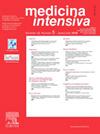逆休克指数乘以格拉斯哥昏迷量表(rSIG)预测外伤性脑损伤死亡率:系统回顾和荟萃分析
IF 3.1
4区 医学
Q2 CRITICAL CARE MEDICINE
引用次数: 0
摘要
目的探讨逆休克指数乘以格拉斯哥昏迷量表(rSIG)是否可以预测外伤性脑损伤(TBI)患者的住院死亡率。这是一项系统回顾和荟萃分析。使用PECO策略,在5个数据库中对截至2024年5月22日发表的研究进行了全面检索。8项研究被确定用于定量分析,并纳入我们的荟萃分析。参与者纳入的主要研究的参与者。干预措施:低rSIG患者作为TBI住院死亡率的预测因子。感兴趣的主要变量:sig,住院死亡率,TBI。我们的荟萃分析共评估了8项观察性研究,包括430,000例TBI患者,观察到6,417例死亡(15%)。在进行敏感性分析后,我们发现,与格拉斯哥昏迷量表(rSIG)相比,逆行休克指数较低的TBI患者的死亡风险高出24% (OR 1.24; 95% CI 1.12-1.38; I²:96%)。此外,幸存者的rSIG值明显高于死亡患者(MD 7.72; 95% CI 1.86-13.58; I²:99%)。本文章由计算机程序翻译,如有差异,请以英文原文为准。
Reverse shock index multiplied by Glasgow coma scale (rSIG) to predict mortality in traumatic brain injury: systematic review and meta-analysis
Objective
To determine whether the Reverse Shock Index multiplied by the Glasgow Coma Scale (rSIG) is a predictor of in-hospital mortality in patients with traumatic brain injury (TBI).
Design
This is a systematic review and meta-analysis.
Setting
A comprehensive search was conducted in five databases for studies published up to May 22, 2024, using a PECO strategy. Eight studies were identified for quantitative analysis and included in our meta-analysis.
Participants
The participants of the included primary studies.
Interventions
Patients with a low rSIG as a predictor of in-hospital mortality in TBI.
Main variables of interest
rSIG, in-hospital mortality, TBI.
Results
Our meta-analysis evaluated a total of eight observational studies encompassing 430,000 patients with TBI, observing 6,417 deaths (15%). After performing a sensitivity analysis, we found that patients with TBI and a low value of the reverse shock index multiplied by the Glasgow Coma Scale (rSIG) had a 24% higher risk of death (OR 1.24; 95% CI 1.12–1.38; I²: 96%). Furthermore, rSIG values were significantly higher in survivors compared to those who died (MD 7.72; 95% CI 1.86–13.58; I²: 99%).
求助全文
通过发布文献求助,成功后即可免费获取论文全文。
去求助
来源期刊

Medicina Intensiva
CRITICAL CARE MEDICINE-
CiteScore
2.70
自引率
20.00%
发文量
146
审稿时长
33 days
期刊介绍:
Medicina Intensiva is the journal of the Spanish Society of Intensive Care Medicine and Coronary Units (SEMICYUC) and of Pan American and Iberian Federation of Societies of Intensive and Critical Care Medicine. Medicina Intensiva has become the reference publication in Spanish in its field. The journal mainly publishes Original Articles, Reviews, Clinical Notes, Consensus Documents, Images, and other information relevant to the specialty. All works go through a rigorous selection process. The journal accepts submissions of articles in English and in Spanish languages. The journal follows the publication requirements of the International Committee of Medical Journal Editors (ICMJE) and the Committee on Publication Ethics (COPE).
 求助内容:
求助内容: 应助结果提醒方式:
应助结果提醒方式:


